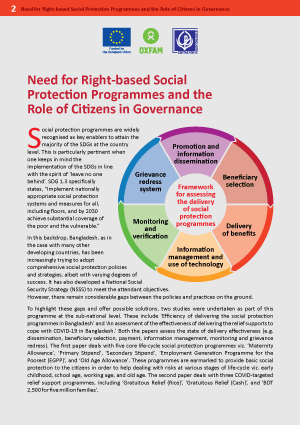 Social protection programmes are widely recognised as key enablers to attain the majority of the SDGs at the country level. This is particularly pertinent when one keeps in mind the implementation of the SDGs in line with the spirit of ‘leave no one behind’. SDG 1.3 specifically states, “Implement nationally appropriate social protection systems and measures for all, including floors, and by 2030 achieve substantial coverage of the poor and the vulnerable.” In this backdrop, Bangladesh, as in the case with many other developing countries, has been increasingly trying to adopt comprehensive social protection policies and strategies, albeit with varying degrees of success. It has also developed a National Social Security Strategy (NSSS) to meet the attendant objectives. However, there remain considerable gaps between the policies and practices on the ground.
Social protection programmes are widely recognised as key enablers to attain the majority of the SDGs at the country level. This is particularly pertinent when one keeps in mind the implementation of the SDGs in line with the spirit of ‘leave no one behind’. SDG 1.3 specifically states, “Implement nationally appropriate social protection systems and measures for all, including floors, and by 2030 achieve substantial coverage of the poor and the vulnerable.” In this backdrop, Bangladesh, as in the case with many other developing countries, has been increasingly trying to adopt comprehensive social protection policies and strategies, albeit with varying degrees of success. It has also developed a National Social Security Strategy (NSSS) to meet the attendant objectives. However, there remain considerable gaps between the policies and practices on the ground.

